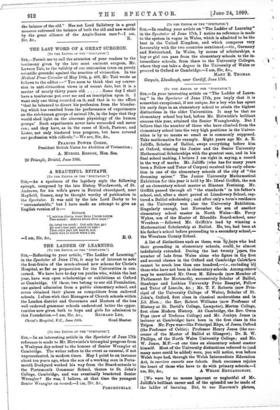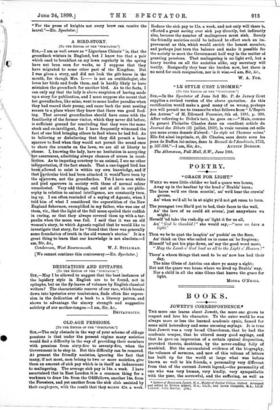[TO THE EDITOR OF THE "SPECTATOR."]
your interesting article on "The Ladder of Learn- ing" in the Spectator of June 17th, you imply that it is somewhat exceptional, if not unique, for a boy who has spent his early days in an elementary school to attain the highest distinctions in the older Universities. It may be that no elementary school boy had, before Mr. Birtwistle's brilliant success this year, attained the Senior Wranglersbip. But I believe that the number of those who have climbed from the elementary school into the very high positions in the -Univer- sities is by no means so small as is commonly supposed. Take mathematics for example. Eight years ago Mr. A. E. Jolliffe, Scholar of Balliol, swept everything before him at Oxford, winning the Junior and the Senior University Mathematical Scholarships with the greatest ease, and in his final school making, I believe I am right in saying, a record in the way of marks. Mr. Jolliffe (who has for many years been a Fellow and Tutor of Corpus) received his early educa- tion in one of the elementary schools of the city of "the dreaming spires." The Junior University Mathematical Exhibition for this year is held by Mr. Idwal Griffith, the son of an elementary school master at Blaenau Festiniog. Mr. Griffith passed through all " the standards " in his father's school, and, after a short period at Llandovery School, cap- tured a Balliol scholarship ; and after only a term's residence at the University won also the University Exhibition. Singularly enough, last November the son of another elementary school master in North Wales—Mr. Percy Wykes, son of the Master of Rhosddn Board-school, near Wrexham — followed Mr. Griffith's lead by winning a Mathematical Scholarship at Balliol. He, too, had been at his father's school before proceeding to a secondary school,—
the Wrexham County School. _
A list of distinctions such as these, won 1% boys who had their grounding in elementary schools, could be almost indefinitely extended. During the last twenty 'sears, the number of lads from Wales alone who figure in to first and second classes in the Oxford and Cambridge Calen1ars cannot be much less than one hundred,—i.e, excluding .01 those who have not been in elementary schools. Among others may be mentioned Mr. Owen M. Edwards (now Member of Parliament for Merioneth), successively Scholar of Balliol, Stanhope and Lothian University Prize Essayist, Fellow and Tutor of Lincoln, &c. ; Mr. T. F. Roberts (now Prin- cipal of the University College of Wales), Scholar of St. John's, Oxford, first class in classical moderations and in Lit. Hum. ; the Rev. Robert Williams (now Professor of History at St. David's College, Lampeter), Merton College, first class Modern History. At Cambridge, the Rev. Owen Prys (now of Trefecca College) and Mr. Jenkyn Jones (a lecturer at Cambridge) have been in the first class in the Tripos. Mr. Prys was—like Principal Rhys, of Jesus, Oxford (the Professor of Celtic); Professor Henry Jones (the suc- cessor of the Master of Balliol at Glasgow); Dr. R. W. Phillips, of the North Wales University College ; and Mr. W. Jones, M.P.—at one time an elementary school master himself. Most of the University distinctions referred to (and many more could be added) were, you will notice, won before Welsh boys had, through the Welsh Intermediate Education Act, la carriers ouverte aux talents. Such successes rejoice the heart of those who have to do with primary schools.—I
[We were by no means ignorant or neglectful of Mr. Jollilfe's brilliant career and of the splendid use he made of the ladder of learning. Bat, to use Emerson's phrase,
"For the press of knights not every brow can receive the laurel."—ED. Spectator.J



















































 Previous page
Previous page